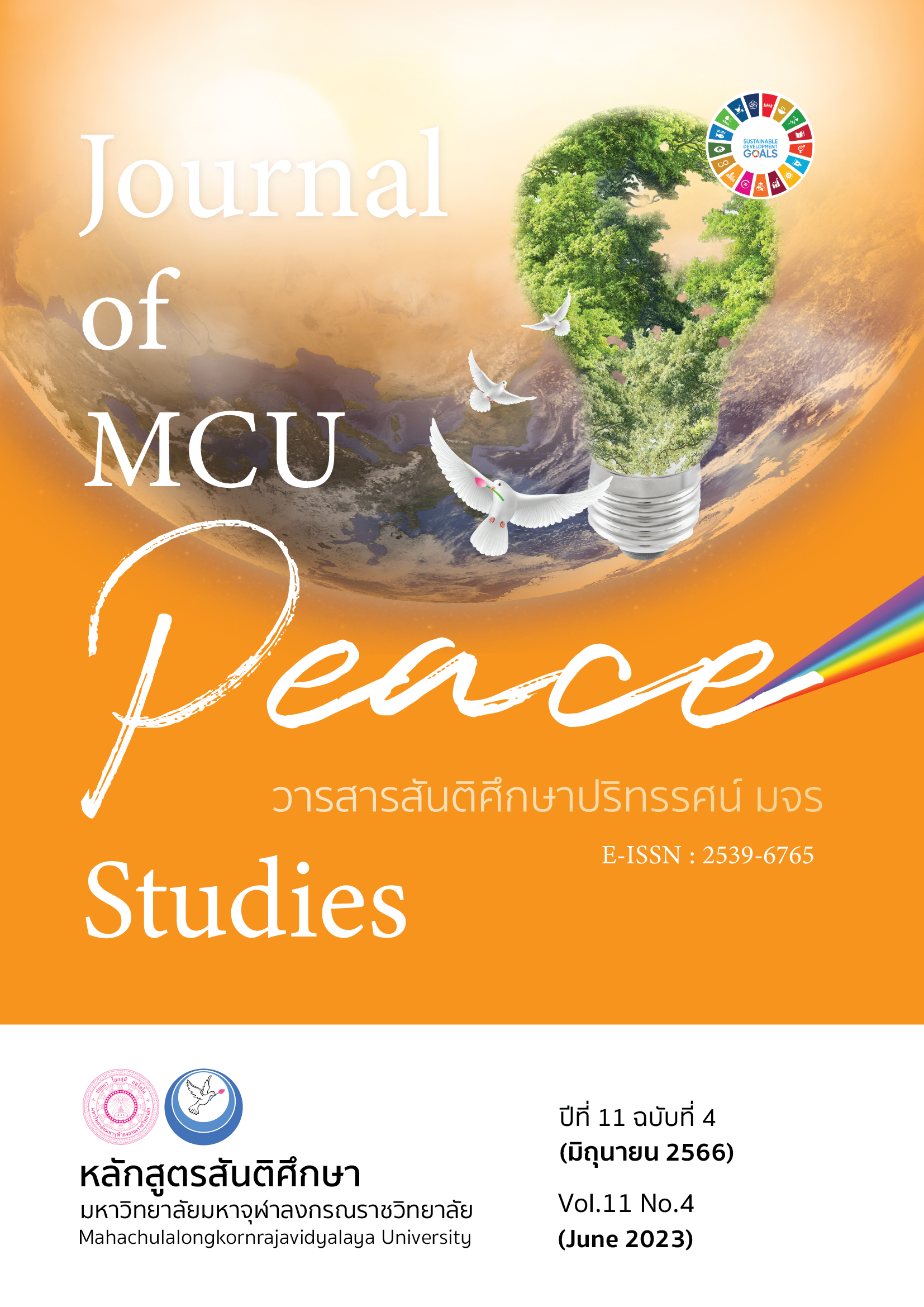องค์ประกอบภาวะผู้นำครูด้านการจัดการเรียนรู้ฐานสมรรถนะ สำหรับครูกลุ่มสาระการเรียนรู้วิทยาศาสตร์และเทคโนโลยี
Main Article Content
บทคัดย่อ
บทความวิจัยนี้ มีวัตถุประสงค์เพื่อ ศึกษาองค์ประกอบภาวะผู้นำครูด้านการจัดการเรียนรู้ฐานสมรรถนะ สำหรับครูกลุ่มสาระการเรียนรู้วิทยาศาสตร์และเทคโนโลยี ซึ่งมีดำเนินการ 2 ขั้นตอน คือ 1) ศึกษาเอกสารเกี่ยวกับองค์ประกอบภาวะผู้นำครูด้านการจัดการเรียนรู้ฐานสมรรถนะ จำนวน 15 แหล่ง เพื่อสังเคราะห์องค์ประกอบภาวะผู้นำครูด้านการจัดการเรียนรู้ฐานสมรรถนะและ 2) ยืนยันองค์ประกอบของภาวะผู้นำครูด้านการจัดการเรียนรู้ฐานสมรรถนะ ตามกรอบที่ได้สังเคราะห์จากเอกสาร โดยผู้ทรงคุณวุฒิ จำนวน 5 คน เครื่องมือที่ใช้ในการวิจัย ได้แก่ แบบวิเคราะห์เอกสารและแบบสัมภาษณ์ วิเคราะห์ข้อมูลโดยการวิเคราะห์เชิงเนื้อหา
ผลการวิจัยพบว่า องค์ประกอบภาวะผู้นำครูด้านการจัดการเรียนรู้ฐานสมรรถนะมี 5 องค์ประกอบ ได้แก่ 1) กระบวนการจัดการเรียนรู้ฐานสมรรถนะ ซึ่งเป็นการวิเคราะห์ผู้เรียนตามสมรรถนะ การออกแบบ การจัดการเรียนรู้เหมาะสมกับผู้เรียน การใช้สื่อและแหล่งเรียนรู้ โดยมีการวัดและการประเมินผล 2) การพัฒนาหลักสูตรฐานสมรรถนะ ครูมีการกำหนดจุดประสงค์ฐานสมรรถนะ มีการจัดการเรียนรู้เชิงสมรรถนะเน้นการปฏิบัติได้ของผู้เรียนในช่วงวัยหรือช่วงชั้นต่างๆ การกำหนดสมรรถนะให้เหมาะสมกับผู้เรียนประกอบด้วยการกำหนดวัตถุประสงค์ฐานสมรรถนะ การวิเคราะห์หลักสูตร การนำหลักสูตรไปใช้และการวัดและประเมินผลหลักสูตร 3) การพัฒนาตนเองและเพื่อนครู ครูมีความมุ่งมั่นในการพัฒนาตนเอง ทำตนเป็นแบบอย่างที่ดี เป็นผู้นําในการพัฒนาเพื่อนครูและเพื่อนร่วมอาชีพ เป็นบุคคลแห่งการเรียนรู้ 4) คุณลักษณะความเป็นครู พฤติกรรมของครูผู้ที่เป็นบุคคลที่เป็นแบบอย่างที่ดี มีความรักและศรัทธาในวิชาชีพครู มีเมตตาต่อศิษย์ เป็นผู้มีคุณธรรมและจริยธรรม มีความซื่อสัตย์สุจริตและความยุติธรรม และ 5) การวัดและประเมินผลฐานสมรรถนะ เป็นการวางแผนการประเมินการเรียนรู้ มีการประเมินตามสภาพจริง การสร้างและหาคุณภาพเครื่องมือ การนำผลการประเมินไปใช้ในการพัฒนาผู้เรียน
Article Details

อนุญาตภายใต้เงื่อนไข Creative Commons Attribution-NonCommercial-NoDerivatives 4.0 International License.
ทัศนะและความคิดเห็นที่ปรากฏในบทความในวารสาร ถือเป็นความรับผิดชอบของผู้เขียนบทความนั้น และไม่ถือเป็นทัศนะและความรับผิดชอบของกองบรรณาธิการ ยินยอมว่าบทความเป็นลิขสิทธิ์ของวารสาร
เอกสารอ้างอิง
Chaimaha, T. (2013). A Model of Developing Teacher Readership on Instructional Management in Secondary School under the Provincial Administrative Organization in the Northeast Region. (Doctoral Dissertation). Sakon Nakhon Rajabhat University. Sakon Nakhon.
Chaona, A. (2013). A Model of Developing Teacher Readership in Learning Management of School under the Office of Primary Educational Service Area in the Educational Inspection Region 11. (Doctoral Dissertation). Sakon Nakhon Rajabhat University. Sakon Nakhon.
Direk, P. (2015). Thai Teachers 4.0. Retrieved December 20, 2021, from https://www.matichon.co.th/news/345042
Green, S. (2020). A Model for Developing Teacher Leadership on Instructional Management in Secondary Schools under the Regional Education Office No. 11, Sakon Nakhon Rajabhat University. (Doctoral Dissertation). Sakon Nakhon Rajabhat University. Sakon Nakhon.
Johnstone, S. M., & Soares, L. (2014). Principles for Developing Competency-Based Education Programs. Change: The Magazine of Higher Learning, 46(2), 12-19.
Kellogg, E. S. (2018). Competency Based Education: Best Practices and Implementation Strategies for Institutions of Higher Education. (Doctoral Dissertation). Education Concordia University. Canada.
Khomphoo, Y. (2019). The Teacher Development in Competency-Based Learning Management Using Project Based Learning in Phananikhom Industrial and Community Education College under the Office of the Vocational Education Commission. (Master’s Thesis). Sakon Nakhon Rajabhat University. Sakon Nakhon.
Khonklong, P. (2017). A Development of Teacher Leadership for Learning Management in the 21st Century: A Case of Anuban Khamcha-I School. (Doctoral Dissertation). Sakon Nakhon Rajabhat University. Sakon Nakhon.
Klein-Collins, R. (2013). Sharpening Our Focus on Learning: The Rise of Competency-Based Approaches to Degree Completion. (Occasional Paper No. 20). Urbana, IL: University of Illinois and Indiana University, National Institute for Learning Outcomes Assessment (NILOA).
Kunlasant, S. (2014). A Model of Developing Teacher Readership in Learning Management in the Educational Opportunity Extension School in the Northeastern Region. (Doctoral Dissertation). Sakon Nakhon Rajabhat University. Sakon Nakhon.
Latimer, M. R. (2016). The Essence of Teacher Leadership: A Phenomenological Inquiry of Professional Growth. International Journal of Teacher Leadership, 7(1), 1-14.
Limpichumnong, C. (2021). Teachers of the New Era towards Competency-Based Learning Management. Retrieved December 3, 2021, from https://www.ipst.ac.th/news/12598/teacher_ipst.html
Michelle Ollila, J. (2018). What Do We Know About Teacher Leadership? Findings from Two Decades of Scholarship. Review of Educational Research Fall 2004, 74(3), 255–316.
Narrat, F. (2021). Competency-Based Curriculum for Student Development in the 21st Century. Retrieved April 15, 2021, from https://www.trueplookpanya.com/blog/content/79321
Nguyen The Dung and Ngo Tu Thanh. (2018). Competency Based Learning with B-Learning Model. International Journal of Scientific & Engineering Research, 9(2), 758-763.
Nut, T. (2019). Deliver 12 Policies and 7 Urgent Agendas to Executives Education Speed Up” (2019). Retrieved March 29, 2019, from https://www.posttoday.com/politic/news/649167
Office of the Education Council: ONEC. (2017). National Education Plan 2017 – 2036. Bangkok: Prigwan Company.
______. (2018). Research and Development of Model Competency-Based Curriculum Instructional According to the National Qualification. Bangkok: Prigwan Company.
______. (2019). Approaches to Develop Student Competency Office of Basic Education Commission Institute.21st Century. Bangkok: Prigwan Company.
______. (2019). Easy to Understand Performance People's Edition and Understand the Competency-Based Curriculum in a Simple Teacher Edition Administrator and Educational Personnel. Bangkok: Prigwan Company.
Pollino, J. (2020). Teacher Leadership and Its Impact on Instructional Policy Implementation. (Doctoral Dissertation). Hofstra University. New York.
Posttoday. (2021). "Treenuch" Gives 12 policies 7 Urgent Agendas to Let the MOE Executives Speed Up. Retrieved May 29, 2021, from https://www.posttoday.com/politic/news/649167
Rodney, M. (2013). Using Instructional leadership as a Predicter of Principal Leadership. Journal of School Leadership, (23)1, 122-151.
Sarah Ryan Joshua D. Cox. (2016). Guide to the Competency-Based Learning Survey for Students. Institute of Education Sciences. National Center for Education Evaluation and Regional Assistance. Regional Educational Laboratory Northeast & Islands Administered.
Şişman, M. (2016). Factors Related to Instructional Leadership Perception and Effect of Instructional Leadership on Organizational Variables: A Meta-Analysis. Educational Sciences: Theory & Practice. Fatih Sultan Mehmet Vakıf University, 16(5), 1761–1787.
Vicharn, P. (2013). Teaching and Learning Support and Development Center in the 21st Century. (3th ed.). Bangkok: Tatha Publication Company.
Wongkruasorn, P. (2018). Development Model of Teacher Leadership on Instructional Management in Thailand 4.0 Erain Primary Schools under the Regional Education Office No. 11. (Doctoral Dissertation). Sakon Nakhon Rajabhat University. Sakon Nakhon.


